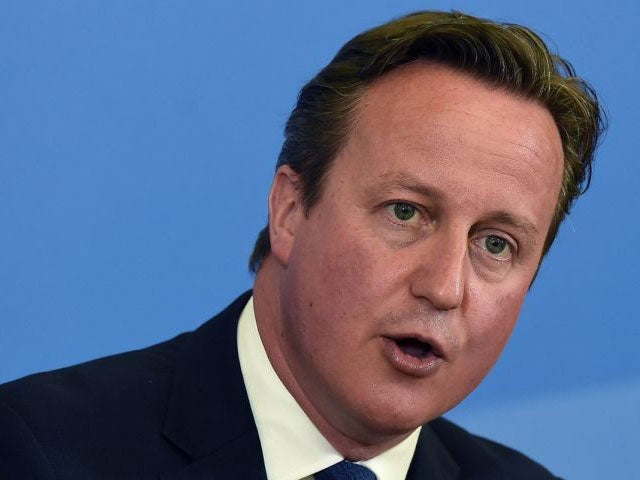It's scary just how much David Cameron doesn't seem to understand extremism
Instead of ignoring all the expert advice he's been given, the Prime Minister should address the political roots of terrorism

Your support helps us to tell the story
From reproductive rights to climate change to Big Tech, The Independent is on the ground when the story is developing. Whether it's investigating the financials of Elon Musk's pro-Trump PAC or producing our latest documentary, 'The A Word', which shines a light on the American women fighting for reproductive rights, we know how important it is to parse out the facts from the messaging.
At such a critical moment in US history, we need reporters on the ground. Your donation allows us to keep sending journalists to speak to both sides of the story.
The Independent is trusted by Americans across the entire political spectrum. And unlike many other quality news outlets, we choose not to lock Americans out of our reporting and analysis with paywalls. We believe quality journalism should be available to everyone, paid for by those who can afford it.
Your support makes all the difference.Imagine a Prime Minister, during the height of The Troubles in Northern Ireland, announcing in a speech that he intended to tackle terrorism head on. To do this, he would crack down on the churches which “quietly condone” the IRA, and criminalise opposition to “British values” and the “rule of law” amongst dissidents.
Forget about pursuing a political resolution to the conflict over Northern Ireland, says the PM – this is about ideology and a misplaced sense of “grievance” by the IRA. As part of a raft of new policies, “non-violent extremists” – such as late Ian Paisley perhaps – would be shut out of any political dialogue, since clearly they were a “gateway” to loyalist terrorism, and certainly in no way able to contribute towards a peaceful future.
Such a PM might be condemned as entirely unable to grasp the nature of the conflict in Northern Ireland at the time, and with the benefit of hindsight, we could also say how entirely counter-productive the unnatural focus on religion and ideology was.
Well in 2015, we have a leader who just delivered a speech outlining how it was bad religion, and not politics, that is the cause of political violence. I use the phrase political violence because whether we are talking about Lee Rigby in the United Kingdom, or the Charleston shootings in the United States, or Anders Brevik in Oslo, we are talking about individuals who had political points to make with the lives they took.
Yet in his speech today, Cameron confidently stated that it was ideology that was the major factor in turning people to violence. This is despite the fact hundreds of academics, many who specialise in radicalisation and conflict, signed a public letter criticising the Government’s PREVENT policy’s obsession with the "unsubstantiated view that religious ideology is the primary driving factor for terrorism". They argued instead that "academic research suggests that social, economic and political factors, as well as social exclusion, play a more central role in driving political violence than ideology.”
In his speech today Cameron also called non-violent extremists a "gateway" to violence. This is despite the fact that in 2010 a Whitehall report specifically argued the opposite, noting that only a handful of violent extremists had ties to non-violent extremist groups – directly in contradiction with Cameron’s own statements today.
Dr Matthew Francis, an academic researching radicalisation, specifically stresses that there is a difference between ideology and violence – “there are radicals that aren’t terrorists, but you also have terrorists who are not radical. It is important to make sure that these concepts are divorced.” This conveyor-belt theory on radicalisation has been discredited at every turn by experts and researchers, and is concerning not least because it casts the net of extremism so wide it undermines some very basic civil liberties.
It's slightly scary how wrong Cameron is about violent extremism. He’s going against the academic consensus on radicalisation as well as the advice of his own civil servants. Instead, he’s apparently taking advice from Maajid Nawaz – a man whose most notable counter-extremism success is to get Tommy Robinson to leave the English Defence League. Nawaz describes himself as a former extremist, which appears to be his sole claim to expertise in the area of radicalisation. Unlike Nawaz, I’m not an extremist – and I’ve never been one either. I, like many millions of other British Muslims, have never seen the appeal of violence. If Cameron had asked me to advise him on his speech today, my advice would have been pretty straightforward.
Firstly, I’d tell him to address the political roots of terrorism – do this and the appeal of extremist ideology will disappear. For example, maybe it isn’t a great idea to give bombs to Saudi Arabia to deploy across Yemen. I mean, maybe it’s in the desperation and human suffering of nations which are bombed that groups like the Islamic State thrive. The Islamic State was born in post-war Iraq, it grew in the wake of conflict in Syria, and it is expanding in places like Libya. Despite this, Cameron still supports a bombing campaign in Yemen.

I’d probably also suggest Cameron not conflate religious conservatism with violent extremism. The new Liberal Democrat leader, Tim Farron, was criticised for refusing to answer a question on whether homosexuality was a sin. Yet he still clarified his commitment to LGBT rights. He demonstrates it is possible to hold unpopular, even unsavoury, religious views while fully participating in society and civic life. Just because a Muslim believes the leadership of a global Caliph would be valuable to Muslims (for example, to resolve global debates about the dates of Islamic festivals), doesn’t mean he or she is supports the Islamic State.
And finally, I’d suggest he stop linking debates about integration to debates about violent extremism. Tackling forced marriage and female genital mutilation is important. But it has nothing to do with terrorism, and largely cuts across religious groups. Instead of calling on Muslims to ascribe to some imagined list of “British values”, Cameron would do well to recognise that British Muslims are already as British as is possible. Their strengths are Britain’s strengths and their failures are Britain’s failures. By ending the incessant questioning of British Muslims, the rhetoric of violent extremists is undermined.
Perhaps if he listened to any of this, we could then formulate a counter-terrorism policy that worked.
Join our commenting forum
Join thought-provoking conversations, follow other Independent readers and see their replies
Comments